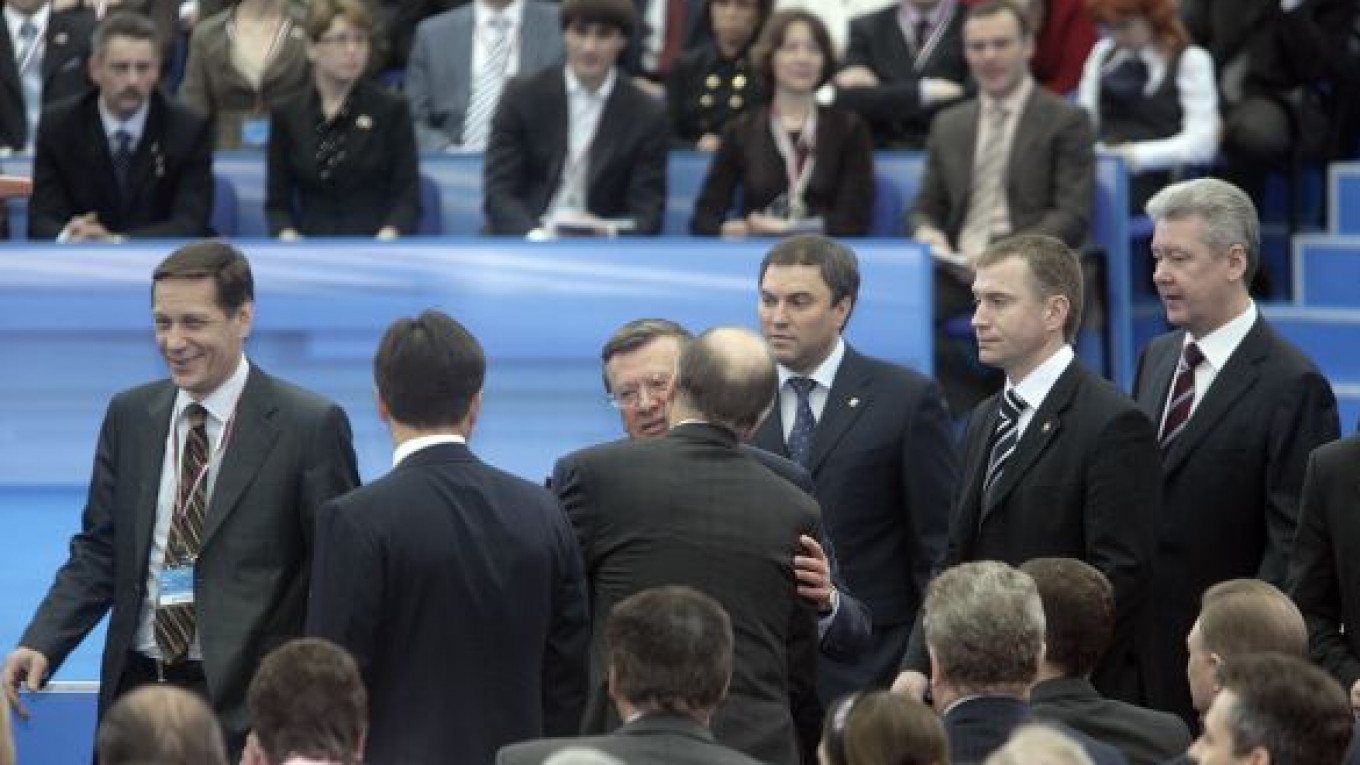Prime Minister Vladimir Putin quickly filled the vacancy created by Sergei Sobyanin's move to City Hall on Thursday by picking State Duma Deputy Speaker Vyacheslav Volodin as his new chief of staff.
Volodin, a staunch Putin ally nicknamed the "margarine oligarch" by the media for his interests in vegetable oil factories, was also appointed as a deputy prime minister by President Dmitry Medvedev, thus acquiring similar political weight to Sobyanin.
While the prime minister appoints his chief of staff alone, the Constitution stipulates that the president appoints the prime minister and his deputies.
Medvedev told Volodin during a meeting at the Gorki presidential residence that he would also succeed Sobyanin as deputy head in the Kremlin's Modernization Commission, according to a transcript of the talks published on the Kremlin web site.
Analysts have said it would be hard to find a suitable successor to Sobyanin, who served as Putin's chief of staff for five years, first in the Kremlin and then at the White House. On Thursday, some said Volodin was a poor match for the job.
"This is a very bad choice — he has no experience in managing a chain of command," said Alexei Mukhin, an analyst with the Center for Political Information, a think tank.
Unlike Sobyanin, Volodin is a politician, not an apparatchik, Mukhin said.
But Lilia Shevtsova, an analyst with the Carnegie Moscow Center, said the new chief of staff shared his predecessor's credentials.
"It was expected that [Sobyanin's successor] would come from Putin's clan — loyal, disciplined and uncharismatic — and Volodin is obviously seen to possess these qualifications," she said.
Volodin is seen as crucial in bringing the White House closer to United Russia before Duma elections next year and the presidential vote in 2012.
The chief of staff's job is to see that orders by both the president and the government are carried out — notably in the regions.
He also oversees the state civil service and personnel decisions and the preparation of the prime minister's speeches and statements, according to the job description published on the government's web site.
The chief of staff has seven deputies, including influential figures like Putin's top foreign policy adviser, Yury Ushakov, and his spokesman Dmitry Peskov.
Anastasia Rakova, a deputy overseeing the government's legal department, has been tipped as a likely candidate to follow Sobyanin to City Hall. Asked if more White House staff changes could be expected, Peskov said by telephone Thursday that it was too early to say.
Vladimir Pribylovsky, head of the Panaroma think tank, said Volodin's appointment was at best a sign of a compromise between two powerful government factions.
"He is neither part of the hardliners around [Deputy Prime Minister Igor] Sechin nor of the group that supports Medvedev," Pribylovsky said.
At worst, he said, the appointment could mean that the battle between the two factions will go on.
Volodin, 46, joined a large pool of candidates only late Wednesday when he was mentioned by the national media, and many analysts had pointed to Kremlin chief of staff Sergei Naryshkin as the most able candidate.
Mukhin and Pribylovsky said Naryshkin had been left in the Kremlin to keep an eye on Medvedev.
Volodin served as deputy governor of his native Saratov region before he was elected to the Duma in 1999 with the Fatherland-All Russia party, which two years later merged with Unity to form United Russia.
He was re-elected in 2003 and 2007 and has been a deputy Duma speaker since January 2004.
He also has served as first secretary of United Russia since 2005, and the post on Thursday was passed to Duma Deputy Sergei Neverov, who had served as his first deputy, the party said in a statement.
Volodin, who is married and has a teenage daughter, is among the wealthiest Duma deputies, declaring a 2009 income of about 360 million rubles ($11.7 million).
His official biography on the Edinros.ru party web site does not mention any business activities, but national media reports compiled by Pribylovsky on Thursday identified him as a co-owner of the Solnechniye Produkty holding, which consists of vegetable oil factories in Moscow and Saratov.
Because these plants mainly produce margarine and mayonnaise, Volodin has been nicknamed the "margarine oligarch" by national media. In 2006, Finans magazine ranked him as the country's 351st richest person, with an estimated wealth of $95 million.
A Message from The Moscow Times:
Dear readers,
We are facing unprecedented challenges. Russia's Prosecutor General's Office has designated The Moscow Times as an "undesirable" organization, criminalizing our work and putting our staff at risk of prosecution. This follows our earlier unjust labeling as a "foreign agent."
These actions are direct attempts to silence independent journalism in Russia. The authorities claim our work "discredits the decisions of the Russian leadership." We see things differently: we strive to provide accurate, unbiased reporting on Russia.
We, the journalists of The Moscow Times, refuse to be silenced. But to continue our work, we need your help.
Your support, no matter how small, makes a world of difference. If you can, please support us monthly starting from just $2. It's quick to set up, and every contribution makes a significant impact.
By supporting The Moscow Times, you're defending open, independent journalism in the face of repression. Thank you for standing with us.
Remind me later.


